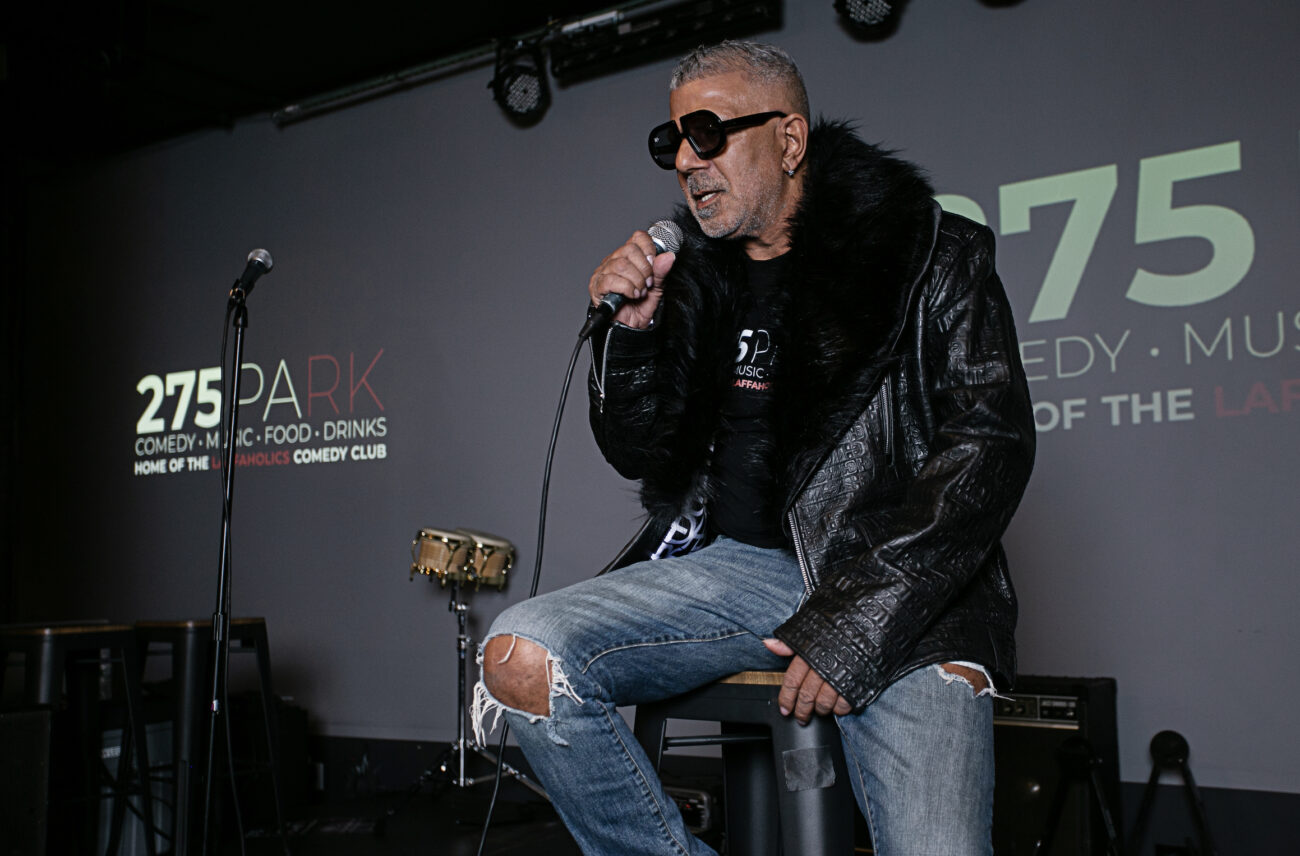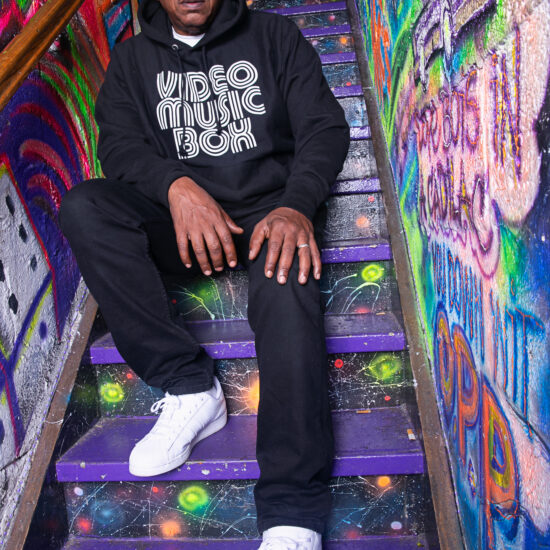With November upon us, men’s health (Movember) is at the forefront of our minds and comedy at its heels. Ray DeJon is a master of comedy and student of health. He went from conquering addiction to surviving a stroke. The Video Music Box host is on an incredible health journey that almost eclipses his phenomenal career. A career that includes interviews with icons like The Notorious B.I.G. and Stevie Wonder, and entrepreneurial ventures like his popular Brooklyn comedy club, 275 Park Ave. Industry Rules sat down with the comedian and learned why laughter is the best medicine.
RA: What attracted you to this career path of hosting?
RD: What attracted me to this career path is that in a large family of seven brothers and sisters, I was always the funny one. I would come home every day and watch Video Music Box. I would say to myself that I want to be the host of that show and promised myself I would do it. I eventually did. I also liked to make people laugh. I always had a great sense of humor. I was a BIG Hip Hop fan. I loved what it brought to my community.
RA: You fought to get on Video Music Box knowing even back then how special it was going to be. What was your favorite thing about being part of that renowned program?
RD: My favorite thing about being part of the show was interviewing great artists. My local celebrity status was also important to build. The popularity allowed me to create my own brand which was rare [in those days]. I used use my celebrity to do speaking engagements around the city at schools, graduations, churches and of course the correctional facilities. Lastly, it helped me tackle more social issues that I always wanted to be involved In and bring awareness along with solutions to the table to support [the community]..
RA: Is there an interview that has stuck with you throughout the years?
I have a few, but my number one favorite was The Notorious B.I.G. He was such a powerful figure when he came in the room, yet he was so different then what the general population perceived of him. He had a killer fashion style and he helped transform people back into the dapper look such as wearing shoes and slacks and a nice button down dress shirt. That interview has been used in three documentaries and one motion picture. It also was my favorite because Ralph [McDaniels] always did the bigger interviews and he trusted me with this interview so it made me feel [great]. My second favorite was Stevie Wonder because he was such an iconic figure. I was so nervous that he felt me trembling. He put his hand on my shoulder and said, “Hey relax, you will be fine”. I thought to myself how would he know that. It helped and I carried out a great interview with him. My third favorite is Patti LaBelle. I hosted a concert and other comedians like Brooklyn Mike were in attendance. Patti thanked everyone except me. Then, Patti sent her security to me and asked me to come to her dressing room. She actually apologized for not mentioning my name and she signaled the DJ to stop playing the music and had me come back on stage and she reintroduced me to the audience. She spoke about me for three minutes. She asked the audience to give me a round of applause. That was so big for me; for an icon to even care as much to admit to a mistake and make up for it. HUGE!
RA: With November coming we are focusing on November/awareness to Men’s Health and your story is incredible. You went from a difficult upbringing, which involved getting locked up & substance abuse, to the phenomenal personality and name you are today. What was the key to winning your battle with addiction?
RD: The key to winning over my addiction was the residential program back in January of 1986. I was in a tunnel smoking by myself and I realized it was three people there; me, myself and I. We collectively all decided it was time [to change]. The program was called Elmcore Youth and Adult Activities. I was there for eight months and one of counselors suggested that I should pursue a career in counseling and that’s when I went for my CSAC License. The other key was comedy. It soothes my soul, mentally and emotionally. I also surrounded myself with work and built my brand as a host, promoter and comedian.
RA: We are so sorry to hear about your stroke and hope you are recovering well. How has your relationship with health changed after that experience?
RD: My relationship with health has changed because I just stay on top of things even more. I always worked out since I was young and I always checked myself out with colonoscopy examinations since I was 35. My dad died at a young age from colon cancer, so, it always been important to me to maintain my health. When I had the stroke, I had paralysis on one side and the doctors gave me the drug TPA and it worked immediately. I have regained my left side activity and I started to go to a herbalist to get more products and information on how to treat myself better. I believe wholeheartedly that I was already in good shape so that’s how I bounced back so well and I thank the LORD daily for taking care of me. I am also a vegetarian. So, I eat well and balanced daily.
RA: Born and Raised in Brooklyn, you still live there and now have a Comedy Club in the iconic city. What can people expect when they come to 275 Park Bk?
RD: People can expect to come into a professional establishment that has great customer service, laughter and a safe environment. We also have amazing food and drinks available to our audience along with a very clean and quality space. We pride ourselves on providing our audience with good customer service and just a great night to enjoy night out.
RA: You obviously have a great love for comedy. What has the art taught you throughout the years?
The art has taught me how to look outside the box to find humor in different cultures. I’ve learned the common dominator in humor is fun. I have learned that the technical parts of comedy are delivery, content and connection which are key components that are very important to the audience. I think also connecting other people together by finding a midpoint between all cultures creates a community of laughter within all people. It identifies what is the core ability in promoting. Knowing how to read my audience is very important to me as well. I look at the audience like a canvas. It helps me etch my story when I feel the energy in the audience.
You can follow Ray via Instagram @RayDeJon and his comedy club @275ParkBk.



Chris Brignolle / November 2, 2023
Keep pushing forward and sharing your journey. As your younger brother, I’m privileged to have seen your transformation firsthand. From childhood, I watched as you turned challenges into strengths. Those days accompanying you to work taught me the value of serving others. I’ll always remember our visit to the “Scared Straight” program at Rikers Island; it was a turning point for me, realizing that seeking approval through negative actions wasn’t the way. It showed me that true strength lies in walking the right path and uplifting others. You’ve played a pivotal role in shaping who I am today, and for that, I’m eternally grateful. Sending abundant blessings from Miami. Remember, everyone faces hurdles in life for a reason. But I know you’ll conquer yours, and your story will inspire others who might feel disheartened by their challenges.
/